How to Stop Living and Start Worrying
How to Stop Living and Start Worrying
Conversations with Carl Cederstrm
Simon Critchley
polity
Copyright Simon Critchley & Carl Cederstrm 2010
The right of Simon Critchley & Carl Cederstrm to be identied as Authors of this Work has been asserted in accordance with the UK Copyright, Designs and Patents Act 1988.
First published in 2010 by Polity Press
Polity Press
65 Bridge Street
Cambridge CB2 1UR, UK
Polity Press
350 Main Street
Malden, MA 02148, USA
All rights reserved. Except for the quotation of short passages for the purpose of criticism and review, no part of this publication may be reproduced, stored in a retrieval system, or transmitted, in any form or by any means, electronic, mechanical, photocopying, recording or otherwise, without the prior permission of the publisher.
ISBN-13: 978-0-7456-5959-6
A catalogue record for this book is available from the British Library.
Typeset in 12 on 14 pt Bembo by Servis Filmsetting Ltd, Stockport, Cheshire.Printed and bound in Great Britain by MPG Books Group Limited, Bodmin, Cornwall.
The publisher has used its best endeavours to ensure that the URLs for external websites referred to in this book are correct and active at the time of going to press. However, the publisher has no responsibility for the websites and can make no guarantee that a site will remain live or that the content is or will remain appropriate.
Every effort has been made to trace all copyright holders, but if any have been inadvertently overlooked the publisher will be pleased to include any necessary credits in any subsequent reprint or edition.
For further information on Polity, visit our website: www.politybooks.com
Contents
Introduction
The conversations offered here provide an introduction and overview to the thought of Simon Critchley, one of the most inuential, provocative, engaging, creative and witty philosophers of our time. In addition to discussions of the nature and tasks of philosophy, Critchley presents the reader with haunting meditations on life, death, love, humour and authenticity. All these miscellaneous subjects are treated in a reckless spirit of candour and shot through with a dark and uncompromising humour. They offer a relentlessly critical diagnosis of our time, but also a uniquely fun and easy entry into philosophy, even for those who otherwise nd philosophy an arcane practice.
Simon Critchley is presently Chair and Professor of Philosophy at the New School for Social Research in New York. But his role as philosopher goes far beyond the boundaries of the university. He frequently writes for the New York Times and the Guardian, and his strenuous engagement with anarchism, the politics of resistance, social movements and experimental art practice has turned him into a spokesman for the Seattle generation, alongside Alain Badiou, Michael Hardt, Antonio Negri and Slavoj  i
i ek. The regrettable side-effect of this engagement, Critchley explains, is that that one ineluctably becomes a brand. But Critchley seems resigned to this fate. Philosophy is not, in his words, a solely academic or professional activity, but an activity that involves exposure and risk.
ek. The regrettable side-effect of this engagement, Critchley explains, is that that one ineluctably becomes a brand. But Critchley seems resigned to this fate. Philosophy is not, in his words, a solely academic or professional activity, but an activity that involves exposure and risk.
To summarize a philosopher, such as Critchley, whose work constantly moves in various and unexpected directions, is a fraught endeavour. At best, it would involve an open invitation. At worst, it would turn a thinker into a set of stereotypes and slogans: a commodity. As will become clear from these conversations, Critchley is neither a commodity nor a brand. His work cannot be reduced to one single line of thought. As he explains: I devoutly hope that everything I do and say doesnt add up.
With that caveat in mind, it can be said that Critchleys work falls squarely into the Continental tradition in philosophy. Combining close readings of Rousseau, Heidegger, Derrida, Levinas and Blanchot with accessible accounts of humour and contemporary forms of political resistance, he offers a fascinating and lively account of philosophy and the history of philosophy. Relentlessly, he has moved from subject to subject, including the intimate and complex relationship between philosophy and poetry, the problem of nihilism and humour, the relation between ethics and politics, and psychoanalysis. And what denes his approach, whether the theme is death or laughter, is that it fearlessly follows a train of thought even when it leads into morally unsafe territories. He explains: I sometimes follow a line simply because it interests me, and adds: Theres no morality in writing.
Today, philosophy is often erroneously regarded as a solipsistic activity produced by a haughty, self-professed intelligentsia that remains out of touch with the culture at large. (And there are, undeniably, circles working hard to verify that prejudice by dispassionately, and at great length, discussing things with no cultural relevance.) However, what you nd in the work of Critchley is the very opposite of this tendency. Following Hegels denition of philosophy as its own time comprehended in thought, he writes with a constant eye on the present, whether the subject is social movements, popular culture, or Barack Obama.
What makes these social and political analyses especially engaging is that Critchleys personal views come to the fore. He openly applauds the subversive potential of groups like Ya Basta and the Invisible Committee, he celebrates the Marx Brothers and he looks upon the self-help movement with healthy contempt. But however ruthless he might be towards others, he always saves the most scathing mockery for himself.
This self-critical wit comes forth in many forms. We nd it on a personal level, when Critchley describes how he is racked with self-doubt in his professional role as a philosopher and teacher. But more importantly, we nd it in his theoretical writing, especially on humour, where he ardently defends a divided subject that is helplessly inauthentic. From psychoanalysis, Critchley takes the idea of the split subject or what he calls the dividual which is a subject that lacks the ability to coincide with itself. This same structure or theme is also at the heart of Critchleys reading of the work of Samuel Beckett. For Critchley, Beckettian subjects are inhabitants of a sinful world in which they can neither live nor die. And yet, they strenuously move on with the courage of self-impotence.
One way to understand the concept of the dividual is in relation to todays pervasive self-help culture. Against self-help manuals, like the 1940s classic, How to Stop Worrying and Start Living, where we nd detailed techniques for controlling ourselves and getting on with our daily routines, this book, How to Stop Living and Start Worrying, offers an alternative approach namely, that in a world dened by ever-growing inequality, political violence, ecological devastation, war and ethnic conict, there are good reasons to worry; and in a time where death has become the last great taboo, we should revive the philosophical art of dying well: ars moriendi.
The book consists of six chapters. the punk scene, through to a serious industrial injury which had huge psychological effects, to the formative years at the University of Essex and nally to life in New York and many other corners of the world.
Critchleys orientation towards philosophy, which he lays out in , is one in which the division between philosophy and culture is rejected. For Critchley, philosophy has a radically local character and must form part of the life of a culture. Philosophy cannot, therefore, be conceived of as a merely professional or academic activity, but a practice that aims to challenge the status quo of the contemporary sociopolitical situation. This means and here Critchley turns to Husserl and Heidegger that the role of the philosopher is to generate genealogies which produce crises. The worst possible situation for a philosopher occurs when a crisis is not recognized. For in such a situation, Critchley argues, human beings sink to the level of happy cattle, a sort of bovine contentment that is systematically confused with happiness.
Next page
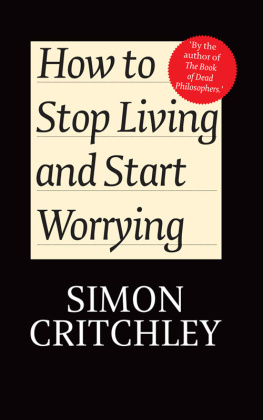
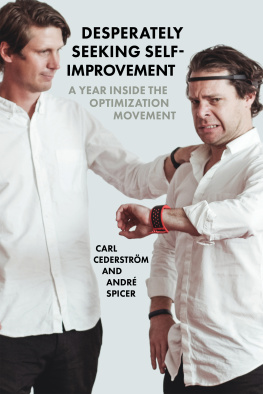

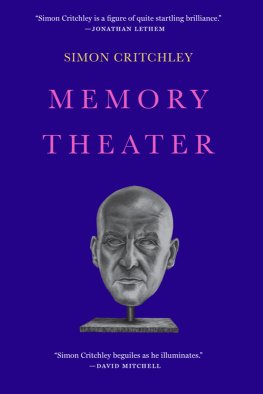
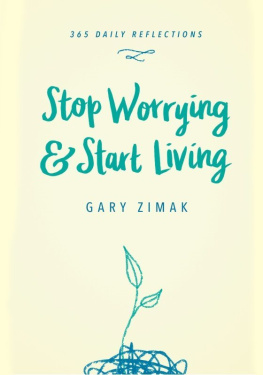
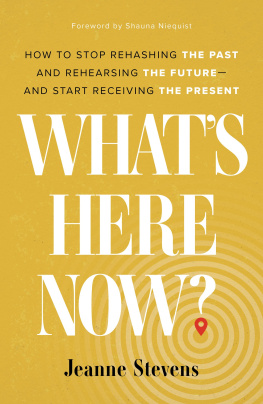
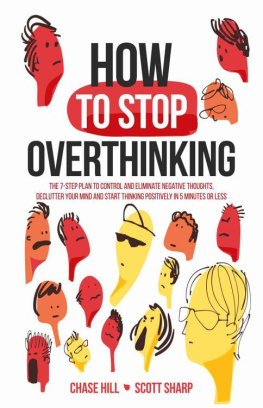

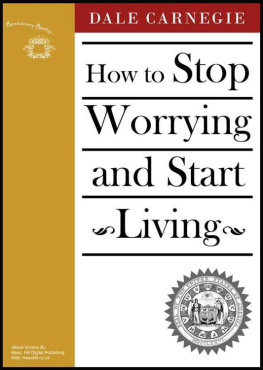
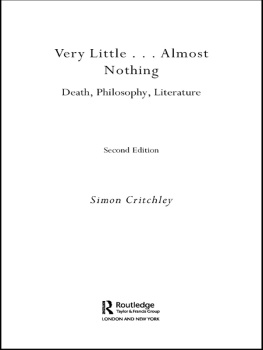
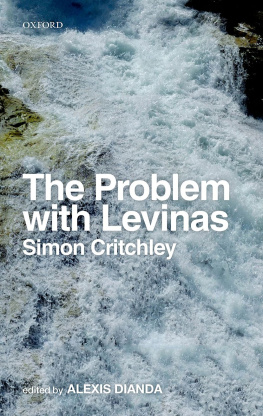
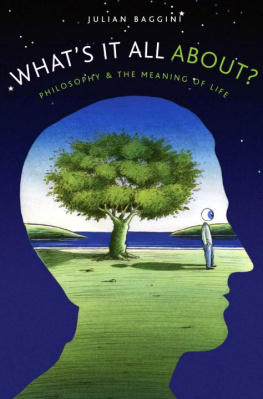
 i
i ek. The regrettable side-effect of this engagement, Critchley explains, is that that one ineluctably becomes a brand. But Critchley seems resigned to this fate. Philosophy is not, in his words, a solely academic or professional activity, but an activity that involves exposure and risk.
ek. The regrettable side-effect of this engagement, Critchley explains, is that that one ineluctably becomes a brand. But Critchley seems resigned to this fate. Philosophy is not, in his words, a solely academic or professional activity, but an activity that involves exposure and risk.